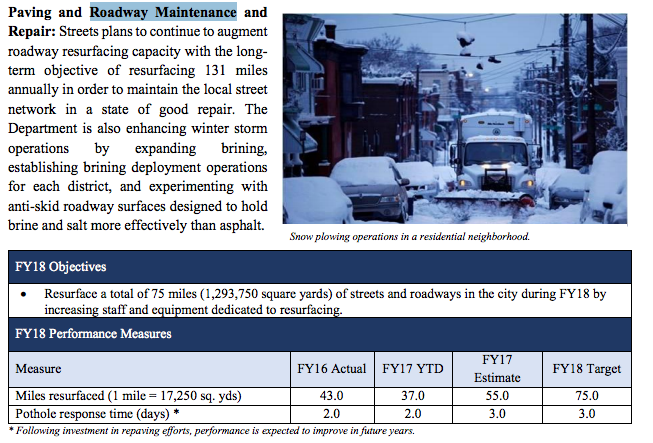
Today, Philadelphia Mayor Jim Kenney’s proposed capital budget appears to be good news for Vision Zero and bicycling infrastructure.
There is a commitment of $5 million over six years to support the engineering needs Vision Zero, $1.2 million to expand bike share, and a projection of 75 miles paved during the 2018-2019 paving season and funds to build the Central Delaware Trail.
The budget report is officially known at the Five Year Financial and Strategic Plan for Fiscal Years 2018-2022. A 400+ page document, page 68 notes,
The six-year programs invests $5 million in General Obligation funding to support the mission of Vision Zero. In November 2016, Mayor Kenney signed Executive order 11-16, creating the Vision Zero Task Force.
By doing so, the City of Philadelphia joins cities around the world in declaring that traffic crashes are not accidents; they are preventable incidents that can be systematically addressed.
Through an equitable approach to education, engineering, and enforcement, Vision Zero in Philadelphia will build on the City’s traffic safety efforts, with the ultimate goal of reducing all traffic related fatalities and serious injuries to zero by 2030. This capital funding will focus on the engineering component, reengineering City streets to improve traffic safety.
The Capital Program also provides $1.2 million for the infrastructure needed to support the City’s Indego Bike Share system, which provides an accessible and affordable alternative to public transit and commuting via motor vehicle.
As part of Executive Order 11-16, Mayor Kenney hired the cities first ever Director of Complete Streets, Kelley Yemen who is expected to issue a report on what the Vision Zero Task Force will recommend as first steps later this year.
As with any new initiative, Vision Zero will need funding to get off the ground and it is good to see the Mayor putting funding behind it.
Because bike lanes are designed and installed when streets are repaved, the ability of the City to build and maintain a high quality bicycle lane network depends on its ability to repave its street. Mayor Kenney’s proposed FY18-23 Capital Program is recommending:
$174 million in new funds (over a six year period) be invested in the reconstruction and resurfacing of City streets (as well as the creation of accessible ramps), helping the City reach the crucial goal of resurfacing 131 miles of streets annually within seven years to ensure a state of good repair.
Interestingly, it proposes $13.3 million in Fiscal Year 18 for the asphalt budget, which is significantly less than what was allocated in FY17 ($22.8 million).
However, we have been told by the Streets Department that there is approximately $6 million in carry-over funds that will be added to the $13.3 million.
The budget projects that the City will have paved 55 miles by June 30th, 2017, and will pave 75 miles in the fiscal year 2018 (Summer 2018-Spring 2019).
The budget document also explains that “additionally, $33.6 million is proposed for the purchase of vehicles for the Streets Department and other departments that have larger, more-expensive vehicles.
This investment for the Streets Department, coupled with funds within the department’s operating budget, will ensure Streets meets its vehicle requirements for the increased investment in repaving.”
The Program also proposing to provide a $90 million investment for improvements to Penn’s Landing, which aims to successfully reconnect the waterfront to Center City to allow waterfront access by all modes of travel, leveraging $160 million in state and private grants.
This funding will go towards several projects, including: the two-mile, multi-use trail along Columbus Boulevard that would accommodate bicycle commuting as well as recreational biking and pedestrian use and the construction of the Delaware River Trail along the east side of Columbus Boulevard between Washington Avenue and Spring Garden Street. Thsi would provide a key connection to neighborhoods north and south of the project site, connecting all the three priority development sites.
These two Central Delaware trail segments are identified as key components of the Hub & Spoke network that the Bicycle Coalition recently proposed.

